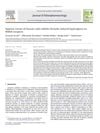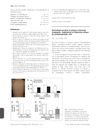 68 citations,
May 2011 in “European Journal of Dermatology”
68 citations,
May 2011 in “European Journal of Dermatology” Acne is caused by genetics, diet, hormones, and bacteria, with treatments not yet curative.
 63 citations,
October 2005 in “Archives of Dermatology”
63 citations,
October 2005 in “Archives of Dermatology” Shorter, thinner hairs indicate AGA, while longer, thicker hairs suggest CTE; counting and measuring shed hairs helps diagnose hair loss type.
 44 citations,
August 2012 in “Journal of Food Science”
44 citations,
August 2012 in “Journal of Food Science” The best way to extract saponins from Eclipta prostrasta is using 70% ethanol, at 70°C for 3 hours with a 14:1 liquid to solid ratio.
 38 citations,
January 2016 in “Cell Death and Disease”
38 citations,
January 2016 in “Cell Death and Disease” The TCL1 transgenic mouse model is useful for understanding human B-cell leukemia and testing new treatments.
 33 citations,
December 2015 in “Neuroendocrinology”
33 citations,
December 2015 in “Neuroendocrinology” Finasteride treatment changes brain steroid levels and receptors, affecting brain function even after stopping treatment.
 31 citations,
May 2012 in “European Journal of Dermatology”
31 citations,
May 2012 in “European Journal of Dermatology” Menopause affects hair and skin; more research needed for treatment.
 27 citations,
July 2008 in “Neuroscience”
27 citations,
July 2008 in “Neuroscience” Finasteride given to baby rats causes anxiety-like behavior and worsens learning from punishment in adult rats.
 26 citations,
August 2014 in “PubMed”
26 citations,
August 2014 in “PubMed” Testosterone improves mood and thinking skills; finasteride has no effect.
 24 citations,
March 2018 in “Experimental Dermatology”
24 citations,
March 2018 in “Experimental Dermatology” Treg dysfunction is linked to various autoimmune skin diseases, and understanding Treg properties is key for new treatments.
 17 citations,
September 2020 in “Journal of Endocrinological Investigation”
17 citations,
September 2020 in “Journal of Endocrinological Investigation” Post-finasteride patients show changes in gut bacteria, possibly causing various symptoms.
 17 citations,
February 2009 in “Journal of Ethnopharmacology”
17 citations,
February 2009 in “Journal of Ethnopharmacology” Asiasari radix extract may relieve certain types of pain by affecting GABA and NMDA receptors.
 14 citations,
September 2018 in “The journal of allergy and clinical immunology/Journal of allergy and clinical immunology/The journal of allergy and clinical immunology”
14 citations,
September 2018 in “The journal of allergy and clinical immunology/Journal of allergy and clinical immunology/The journal of allergy and clinical immunology” A boy's growth and immune problems were caused by a new mutation in the STAT5B gene.
 14 citations,
June 2018 in “JAMA Dermatology”
14 citations,
June 2018 in “JAMA Dermatology” Trichoscopy is useful for diagnosing and monitoring hair and scalp conditions over time.
 14 citations,
December 2013 in “Molecules”
14 citations,
December 2013 in “Molecules” Two compounds from Asiasarum heterotropoides roots show potential as lung cancer treatments without harming normal cells.
 12 citations,
June 2013 in “The American Journal of Dermatopathology”
12 citations,
June 2013 in “The American Journal of Dermatopathology” A new method using visual aids to diagnose hair diseases was effective after brief training.
 11 citations,
August 2019 in “BMJ”
11 citations,
August 2019 in “BMJ” Post-finasteride syndrome causes sexual, physical, and psychological symptoms, but more research is needed to understand its causes and connection to finasteride.
 11 citations,
April 2015 in “International Journal of Cosmetic Science”
11 citations,
April 2015 in “International Journal of Cosmetic Science” Adenosine helps grow thicker hair in Japanese men with hair loss.
 11 citations,
March 2007 in “Digestive Diseases and Sciences”
11 citations,
March 2007 in “Digestive Diseases and Sciences” The conditions alopecia areata, primary sclerosing cholangitis, and ulcerative colitis may be linked by shared autoimmune and cell death mechanisms.
 11 citations,
September 1999 in “Journal of the European Academy of Dermatology and Venereology”
11 citations,
September 1999 in “Journal of the European Academy of Dermatology and Venereology” Immunomodulatory therapies are effective for treating cutaneous lymphoma, particularly in early stages.
 10 citations,
October 2015 in “Journal of Dermatology”
10 citations,
October 2015 in “Journal of Dermatology” Adenosine treatment thickens hair in Caucasian men with hair loss.
 10 citations,
January 2014 in “Journal of Mid-life Health”
10 citations,
January 2014 in “Journal of Mid-life Health” Menopause can cause skin issues, and seeing a dermatologist helps.
 7 citations,
January 2009 in “Immunological investigations”
7 citations,
January 2009 in “Immunological investigations” A 3-year-old boy lost all his hair due to a rare reaction to phenobarbital, but it grew back after steroid treatment.
 6 citations,
April 2013 in “International Journal of Dermatology”
6 citations,
April 2013 in “International Journal of Dermatology” Valproic acid helped hair growth in alopecia patient; more research needed.
 5 citations,
June 2022 in “Frontiers in immunology”
5 citations,
June 2022 in “Frontiers in immunology” Increasing Treg cells in the skin does not cure hair loss from alopecia areata in mice.
 5 citations,
June 2015 in “British Journal of Dermatology”
5 citations,
June 2015 in “British Journal of Dermatology” A certain medication improved severe itching in a boy with liver and bowel disease by reducing histamine levels, suggesting a new treatment target.
 5 citations,
June 2004 in “The Journal of The British Menopause Society”
5 citations,
June 2004 in “The Journal of The British Menopause Society” Testosterone therapy can improve sexual satisfaction and mood in surgically menopausal women when used with estrogen, but its long-term safety and effects on naturally menopausal and premenopausal women are unclear.
 4 citations,
March 2013 in “Neuropsychiatric Disease and Treatment”
4 citations,
March 2013 in “Neuropsychiatric Disease and Treatment” A woman with anorexia and Cushing's syndrome improved after tumor removal, highlighting the need to consider hormonal issues in psychiatric conditions.
 4 citations,
July 1993 in “The Journal of Dermatologic Surgery and Oncology”
4 citations,
July 1993 in “The Journal of Dermatologic Surgery and Oncology” The article concludes that hair restoration techniques must account for ongoing hair loss to ensure successful long-term results.
 3 citations,
March 2021 in “International journal of pharmaceutical sciences review and research”
3 citations,
March 2021 in “International journal of pharmaceutical sciences review and research” Licorice has many health benefits but more research is needed to fully understand them.
 3 citations,
September 2019 in “American Journal of Men's Health”
3 citations,
September 2019 in “American Journal of Men's Health” Finasteride may not affect gynecomastia recurrence after mastectomy.






























